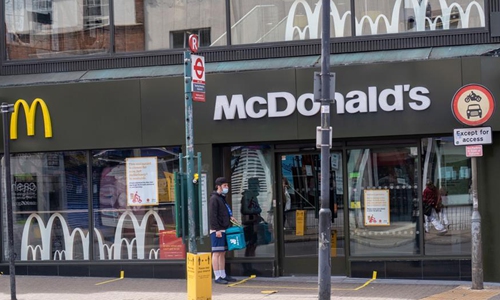Fears for UK homeless as virus hotel scheme draws to close
Source:AFP Published: 2020/6/7 17:58:40
Thousands of homeless people in Britain were given hotel rooms to protect them from coronavirus but as the outbreak slows, charities fear they could soon be back on the streets.

Lisa was among 15,000 people in England given emergency accommodation as part of an unprecedented government scheme in March to get "Everyone In" as COVID-19 spread.
She has a chronic health condition and had been living on the streets, relying on temporary shelters run by the charity Glass Door, which helped her onto the hotel scheme.
"I was elated," the 30-something told AFP by telephone. "To be able to sleep in a bed, it was like sleeping on cloud nine!"
But her room in a London hotel is only confirmed until the end of June - and as the government eases a nationwide lockdown, she is getting increasingly anxious.
The scheme "does give me some glimmer of hope that things can go forward. When you are on the street it feels never-ending," she said.
"I have faith that the charities are not going to put us back on the street. But if it's a case of going back into the kind of temporary accommodation I was in, I know the cycle will be repeated."
Campaigners are demanding the government urgently clarify what will happen to people like Lisa when the hotel contracts run out. "Returning people back onto the streets should not be an option, but time is running out to find alternative solutions," said Glass Door Chief operating officer Lucy Abraham. There are also calls for wider action amid warnings that homelessness will increase as the economic impact of the outbreak bites.
"The government's actions and support so far are welcome, but there is still a long way to go," said a joint letter to ministers from leading homelessness charities.
"With the risk of a second wave of infection and looming economic crisis, more needs to be done. Getting this right is critical for the health and economic security of tens of thousands of people and families."
Charities had warned that people living on the streets or in crowded hostels were particularly vulnerable to coronavirus, which has killed around 40,000 people in Britain so far.
Prime Minister Boris Johnson's government responded with an extraordinary effort, housing 14,610 people sleeping rough or at risk of doing so in England - 4,450 in London alone.
Many were given rooms in shuttered hotels, providing a safe and comfortable environment that some people had not experienced for years.
"We've heard some incredible stories of people really seizing this opportunity and showing they can hold down a tenancy," said Balbir Chatrik, of the youth homelessness charity Centrepoint.
"But many more require the sort of intensive support that can only be provided in tandem with stable accommodation."

A delivery man waits outside a McDonald's restaurant in London, Britain, May 17. Photo: Xinhua
Lisa was among 15,000 people in England given emergency accommodation as part of an unprecedented government scheme in March to get "Everyone In" as COVID-19 spread.
She has a chronic health condition and had been living on the streets, relying on temporary shelters run by the charity Glass Door, which helped her onto the hotel scheme.
"I was elated," the 30-something told AFP by telephone. "To be able to sleep in a bed, it was like sleeping on cloud nine!"
But her room in a London hotel is only confirmed until the end of June - and as the government eases a nationwide lockdown, she is getting increasingly anxious.
The scheme "does give me some glimmer of hope that things can go forward. When you are on the street it feels never-ending," she said.
"I have faith that the charities are not going to put us back on the street. But if it's a case of going back into the kind of temporary accommodation I was in, I know the cycle will be repeated."
Campaigners are demanding the government urgently clarify what will happen to people like Lisa when the hotel contracts run out. "Returning people back onto the streets should not be an option, but time is running out to find alternative solutions," said Glass Door Chief operating officer Lucy Abraham. There are also calls for wider action amid warnings that homelessness will increase as the economic impact of the outbreak bites.
"The government's actions and support so far are welcome, but there is still a long way to go," said a joint letter to ministers from leading homelessness charities.
"With the risk of a second wave of infection and looming economic crisis, more needs to be done. Getting this right is critical for the health and economic security of tens of thousands of people and families."
Charities had warned that people living on the streets or in crowded hostels were particularly vulnerable to coronavirus, which has killed around 40,000 people in Britain so far.
Prime Minister Boris Johnson's government responded with an extraordinary effort, housing 14,610 people sleeping rough or at risk of doing so in England - 4,450 in London alone.
Many were given rooms in shuttered hotels, providing a safe and comfortable environment that some people had not experienced for years.
"We've heard some incredible stories of people really seizing this opportunity and showing they can hold down a tenancy," said Balbir Chatrik, of the youth homelessness charity Centrepoint.
"But many more require the sort of intensive support that can only be provided in tandem with stable accommodation."
Posted in: EUROPE